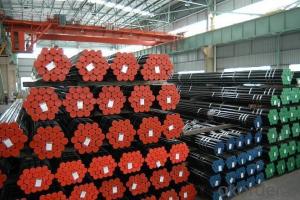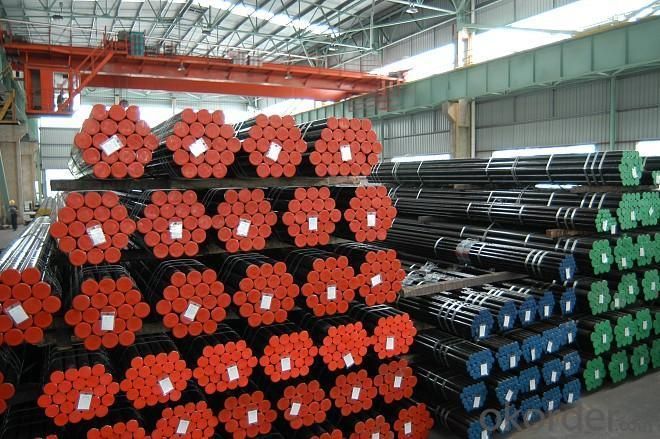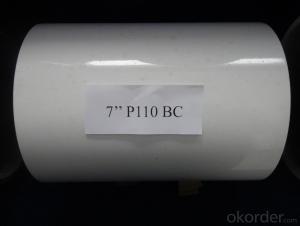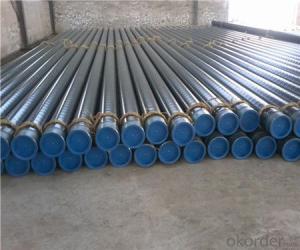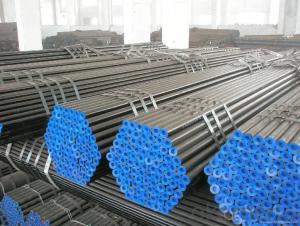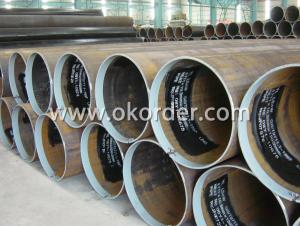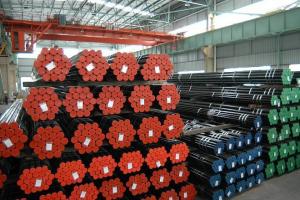Seamless Steel Pipe API 5L All Sizes High Quality
- Loading Port:
- China main port
- Payment Terms:
- TT OR LC
- Min Order Qty:
- 50 m.t.
- Supply Capability:
- 10000 m.t./month
OKorder Service Pledge
OKorder Financial Service
You Might Also Like
Specification
Seamless Steel Pipe API 5L All Sizes Best Quality
Structure:
Seamless pipe is formed by drawing a solid billet over a piercing rod to create the hollow shell. As the manufacturing process does not include any welding, seamless pipes are perceived to be stronger and more reliable. The usage is to convey water, gas, oil and so on.
Main Features:
• High manufacturing accuracy
• High strength
• Small inertia resistance
• Strong heat dissipation ability
• Good visual effect
• Reasonable price
Specification:
Standard | GB, DIN, ASTM ASTM A106-2006, ASTM A53-2007 |
Grade | 10#-45#, 16Mn 10#, 20#, 45#, 16Mn |
Thickness | 8 - 33 mm |
Section Shape | Round |
Outer Diameter | 133 - 219 mm |
Place of Origin | Shandong, China (Mainland) |
Secondary Or Not | Non-secondary |
Application | Hydraulic Pipe |
Technique | Cold Drawn |
Certification | API |
Surface Treatment | factory state or painted black |
Special Pipe | API Pipe |
Alloy Or Not | Non-alloy |
Length | 5-12M |
Outer Diameter | 21.3-610mm |
Grade | 20#, 45#, Q345, API J55, API K55, API L80, API N80, API P110, A53B |
Standard | ASME, ASTM |
1) Material:20#(ASTM A 106/A53 GRB.API5LGRB,GB),45#,16Mn,10#.
2) Specification range:OD:21.3-610mm,WT:6-70mm,length:6-12m or according to the requirement of clients.
3) Excutive standards:GB,ASME API5L.ASTM A 106/A53,Despite of the above standards,we can also supply seamless steel pipe with standard of DIN,JIS,and so on,and also develop new products according to the requirements of our clients!
4) Surface:black lacquered,varnish coating or galvanized.
5) Ends:Beveled or square cut,plastic capped,painted.
6) Packing:bundles wrapped with strong steel strip,seaworthy packing.
Our advantages:
Our products are manufactured strictly according to national and internaional standard, and we take a test
on every pipe before delivered out. If you want see our quality certifications and all kinds of testing report, please just ask us for it.
Guaranteed: If products’ quality don’t accord to discription as we give or the promise before you place order, we promise 100% refund.
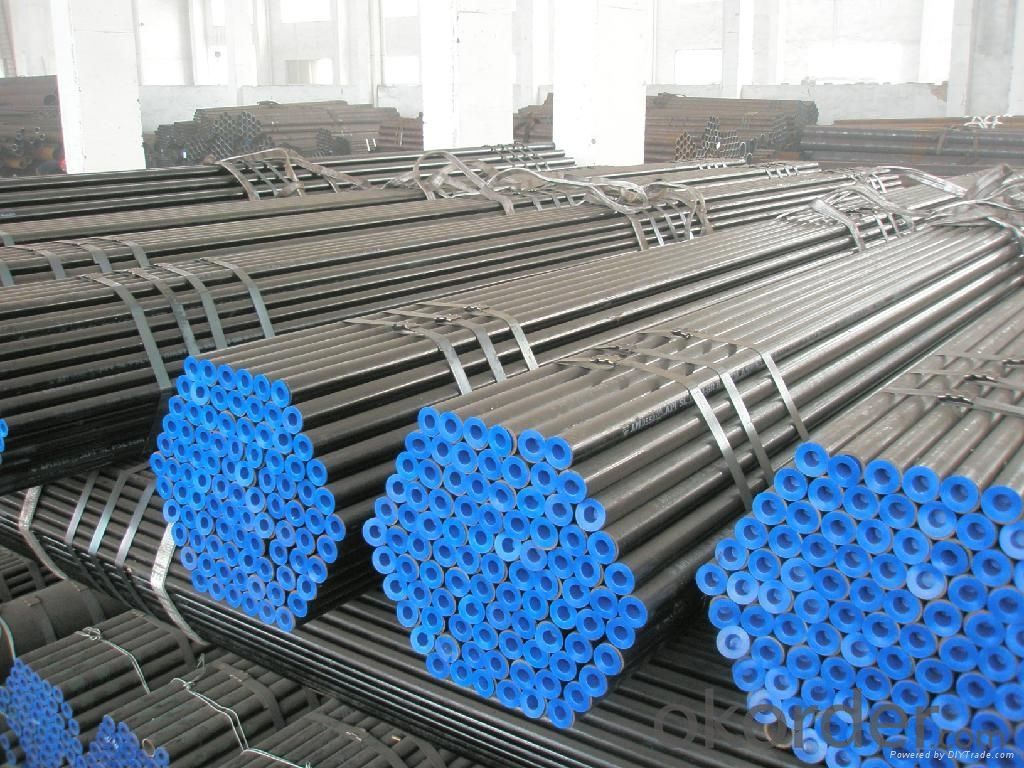
- Q: Can steel pipes be used for telecommunications cables?
- Steel pipes are not appropriate for telecommunications cables. Typically, fiber optic or copper materials are used for telecommunications cables. Steel pipes serve different purposes in construction and plumbing, but they are not suitable for transmitting data or electrical signals. Fiber optic cables are specifically designed to carry high-speed data over long distances, while copper cables are utilized for transmitting both data and electrical signals. Unlike steel pipes, these cables possess specific insulation and shielding properties required for telecommunications purposes.
- Q: How do you repair damaged steel pipes?
- To fix steel pipes that have been damaged, there are several steps you can take: First, you need to determine the extent of the damage. Assess how severe it is to decide if you can repair it or if you need to replace the entire pipe. Next, isolate and drain the section that is damaged. Shut off the water supply to that part of the pipe and drain any remaining water to prevent further leaks or damage. After that, clean the damaged area by removing any dirt, rust, or debris. You can use a wire brush or sandpaper for this job. Then, prepare the damaged area by roughening the surface with coarse sandpaper. This will help the repair material adhere better to the pipe. Next, choose a repair method based on the size and location of the damage. There are different options available such as using epoxy putty, pipe wraps, or clamps. Once you've chosen a repair method, follow the instructions provided to apply the repair material to the damaged area. Make sure it covers the entire damaged section and extends slightly beyond it for added protection. After applying the repair material, allow it to cure according to the manufacturer's instructions. This will ensure a strong bond and effective sealing of the damaged area. Once the repair has cured, turn the water supply back on and check for any leaks. If there are no signs of leakage, then the repair has been successful. If there are still leaks, you may need to reconsider the repair or seek professional help. Keep in mind that these steps are a general guideline for repairing damaged steel pipes. The specific repair method may vary depending on the size and severity of the damage. In more complex cases or if you're unsure, it's best to consult a professional plumber or pipe repair specialist.
- Q: What is the difference between steel pipes and PVC-O pipes?
- Steel pipes and PVC-O pipes differ in their material composition, strength, durability, and installation process. Steel pipes are made of steel, which makes them strong and suitable for high-pressure applications. However, they are prone to corrosion and require additional coating for protection. On the other hand, PVC-O pipes are made of a specially formulated, high-strength PVC material, which provides excellent resistance to corrosion, chemicals, and abrasion. PVC-O pipes are also lighter, easier to handle, and have a longer lifespan compared to steel pipes. Additionally, PVC-O pipes are installed using a jointing system, eliminating the need for welding or threading like steel pipes.
- Q: Are steel pipes suitable for underground industrial waste disposal?
- Steel pipes are often used for underground industrial waste disposal due to their durability and strength. They have the ability to withstand the harsh conditions underground, including moisture, pressure, and corrosion. Additionally, steel pipes are resistant to chemical reactions, making them suitable for handling various types of industrial waste. They can effectively transport and contain hazardous materials, ensuring the safety and protection of the environment and surrounding areas. Overall, steel pipes are considered a reliable and efficient option for underground industrial waste disposal.
- Q: What are the different types of steel pipe fittings?
- There are various types of steel pipe fittings, including elbows, tees, reducers, couplings, unions, plugs, caps, and flanges.
- Q: What are the standard specifications for steel pipes?
- The standard specifications for steel pipes vary depending on the specific application and industry requirements. However, some common standard specifications for steel pipes include dimensions, material composition, strength, and testing procedures. These standards are set by organizations such as the American Society for Testing and Materials (ASTM), the International Organization for Standardization (ISO), and other national or international bodies. It is important to consult the appropriate standard specifications for specific project needs.
- Q: What are the different types of steel pipe flanges?
- There are several types of steel pipe flanges, including slip-on flanges, weld neck flanges, socket weld flanges, threaded flanges, blind flanges, and lap joint flanges. Each type has unique features and is used in specific applications based on factors such as pressure ratings, pipe size, and end connections.
- Q: What are the potential health hazards associated with steel pipe installation?
- Some potential health hazards associated with steel pipe installation include exposure to hazardous chemicals used in the coating or treatment of the pipes, inhalation of dust or fumes generated during cutting or welding, and physical injuries due to accidents or mishandling of heavy equipment. Additionally, improper handling or disposal of waste materials and contaminated water can pose environmental health risks. It is important to follow proper safety protocols, use personal protective equipment, and ensure proper ventilation and waste management to mitigate these hazards.
- Q: How are steel pipes manufactured?
- Steel pipes are typically manufactured through a process called seamless or welded pipe manufacturing. In the seamless process, a solid steel billet is heated and pierced to create a hollow tube, which is then stretched and rolled to the desired size and shape. In the welded process, steel sheets are formed into a pipe shape and welded along the seam. These pipes are then further processed and finished before use in various industries.
- Q: How are steel pipes used in oil refineries?
- Steel pipes are used in oil refineries for various purposes such as transporting crude oil, refined petroleum products, and other chemicals throughout the facility. They are crucial for the overall infrastructure, including piping networks, storage tanks, and processing units, ensuring efficient and safe fluid flow.
Send your message to us
Seamless Steel Pipe API 5L All Sizes High Quality
- Loading Port:
- China main port
- Payment Terms:
- TT OR LC
- Min Order Qty:
- 50 m.t.
- Supply Capability:
- 10000 m.t./month
OKorder Service Pledge
OKorder Financial Service
Similar products
Hot products
Hot Searches
Related keywords
